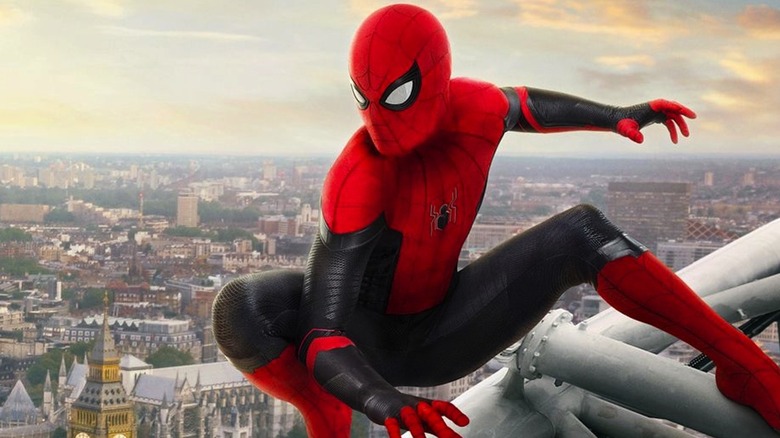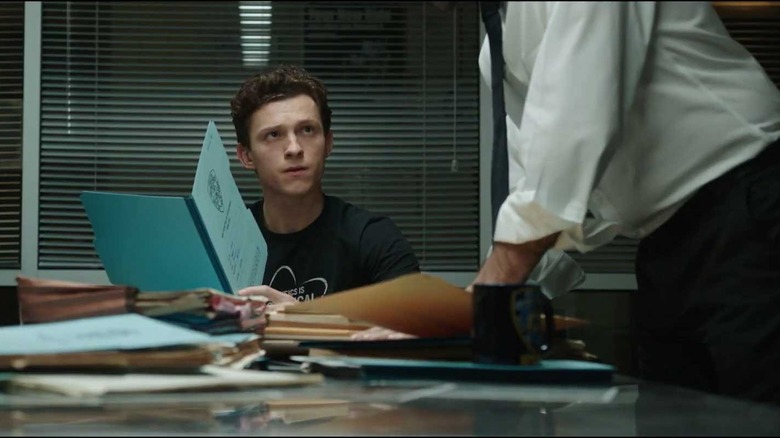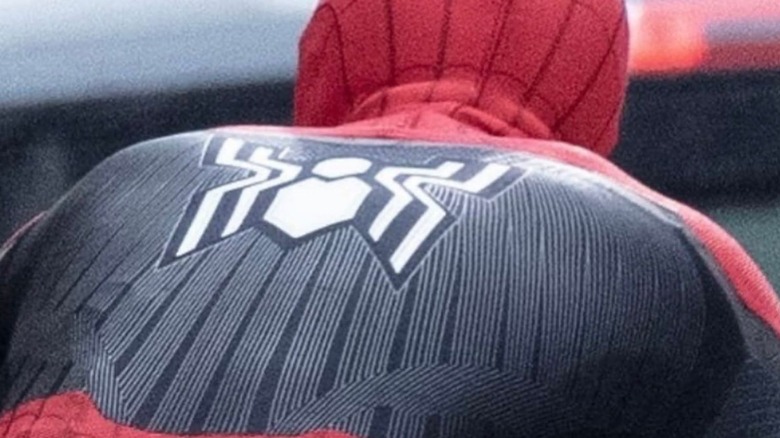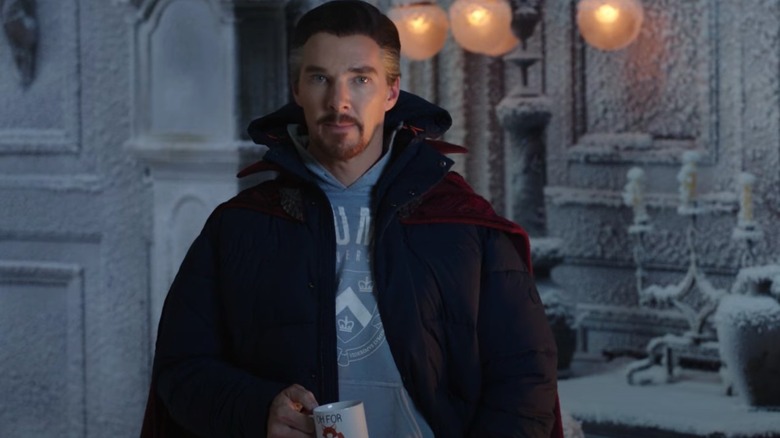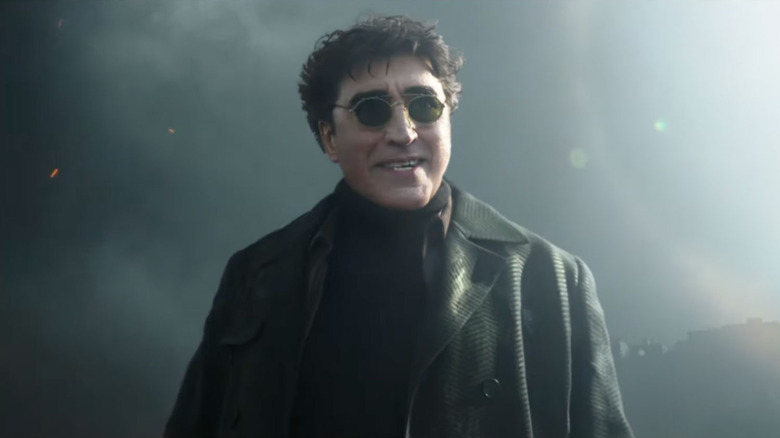Spider-Man: No Way Home Spoiler Review: With Great Power Comes Great Redemption
Warning: spoilers for "Spider-Man: No Way Home" follow.
About halfway through John Watts' "Spider-Man: No Way Home," the occasionally competent Dr. Strange (Benedict Cumberbatch) has magically opened a portal to other dimensions, allowing characters from previous Spider-Man films to invade. He gravely intones that the multiverse is something we know very little about. This is an odd claim delivered to an audience that has likely seen Spock with a goatee. Multiverses and alternate versions of existing characters have existed in science fiction for many, many decades and was even the central conceit behind the 2018 Spider-Man film "Spider-Man: Into the Spider-Verse."
As such, it's been incredibly frustrating to witness the Marvel machine slow-walk the concept across multiple films and TV shows, assuring that audiences understand what's going on. It's perfectly easy to understand: While actors are aging out, and contracts are expiring, Marvel Studios needs to recast familiar roles in order to maintain their central gimmick: the interconnectivity of all their films. The introduction of the multiverse concept into this particular film series, then, is shrewd. Is Iron Man dead? Bring him back from another dimension, played by a younger actor. Are there multiple versions of a certain character from the comics that are all beloved? There is now an organic reason for them to co-exist. Can we get a retired actor back? Now they can come from another dimension and interact with the present version.
This last conceit is the raison d'être of "No Way Home," which unites the current Spider-Man, played by Tom Holland, with The Green Goblin from "Spider-Man" (2002), Dr. Octopus from "Spider-Man 2" (2004), The Sandman from "Spider-Man 3" (2007), The Lizard from "The Amazing Spider-Man" (2012), and Electro from "The Amazing Spider-Man 2" (2014), all played by their original players Willem Dafoe, Alfred Molina, Thomas Hayden Church, Rhys Ifans, and Jamie Foxx respectively. Also aiding Spider-Man in wrangling the Sinister Five (the deceased Mysterio from "Spider-Man: Far From Home" must count as the sixth) are previous Spider-Men played by Tobey Maguire and Andrew Garfield, also culled from the back recesses of the multiverse. The climax involves all five villains, all three Peter Parkers, and a put-upon Dr. Strange having a tussle on a scaffolding surrounding the Statue of Liberty, which is likely not a reference to the climax of "X-Men" (2000).
Passing of the Baton
The gravitas placed on "No Way Home's" multiverse conceit is, of course, fan service of the highest order; anyone who has watched all the previous iterations of Spider-Man may feel a tingle of their own as their affection for certain characters are grandfathered into Watts' film. There is a sense of the baton being passed to a new generation of Spider-Men (Spiders-Man?) as Maguire gives Garfield a battlefield pep-talk wherein he calls the other Spider-Man "amazing."
There is a giddy glee as Maguire reveals that his spider web powers are a mutation of his body and not a homemade construction as they are with Holland and Garfield (and also the comic books). And there is a shared sadness of all three Spider-Men as they mourn the trauma of losing their Uncles Ben — and, in a shocker for this film, Aunt May. Those who have affection for any single version of Spider-Man will find their affection validated by the appearance of the others, and those with affection for all three will see their affection multiplied.
This passing of affection from one Spider-Man to the next, however, feels unneeded. Maguire starred in three Spider-Man films, and Garfield in two. Holland has already played Spider-Man in six feature films in five years, and has already firmly established his place in the MCU firmament. Passing the torch to Holland feels about as necessary a gesture as Kirk passing the torch to Picard in "Star Trek: Generations." Picard had already established who he was with seven seasons of television; he was no longer in Kirk's shadow. The same can be said of Holland. He doesn't need to be wrested from the towering legacy of previous films. He's fine on his own.
It's Not Easy Being Spider-Man
And be on his own he must in "No Way Home." Holland's Spider-Man had previously been featured in stories wherein he could only define himself in his relation to the Avengers, and to Iron Man in particular. Will he be part of the team? Will he get the scholarship to work with a well-moneyed weapons designer?
One of the most appealing aspects of Spider-Man is that he was a working-class hero. On top of his duties as a vigilante, Spider-Man also had trouble paying bills, his costume would run in the wash, and his night job cut into his social and academic life. Spider-Man's poverty has been jettisoned in the Watts' films, featuring a Spider-Man who is given everything he needs by Lockheed-Martin. This is a corporate Spider-Man. A comfortable Spider-Man. The criticisms that Spider-Man was unable to form his own identity are fair, as he was — both in in-universe story, and as a tool for Disney — a cog in a larger machine.
The relatable aspects of Spider-Man creep back into the character in "No Way Home." At the end of "Far From Home," Peter Parker's secret identity was revealed to the world which, in this film, kicks off a quagmire of personal problems. He is stalked in the hallways of his high school, he has no privacy (he has to move in with "Iron Man's" Happy Hogan, played by Jon Favreau), and he is pilloried by the press represented by J. Jonah Jameson (J.K. Simmons) reimagined as an Alex Jones-like conspiracy barker. Most devastatingly, his newfound infamy has prevented he, his girlfriend MJ (Zendaya), and his best friend Ned (Jacob Balaton) from getting into MIT. It's during these early scenes — mercilessly paced — that we see Spider-Man reconnect with what makes him interesting: That being a superhero kinda sucks.
Spider-Man is a superhero driven by guilt and ignominy. He does the right thing because he's compelled to do so; we all know the "great responsibility" catchphrase, repeated in this film by Aunt May (Marisa Tomei) right before her death. This may seem like a sad moment, but it may also elicit a cynical eyeroll to hear the theme repeated out loud for the umpteenth time.
The Death Penalty
But it's neither the multiverse aspects, nor the reconnection of Spider-Man to his roots that make "No Way Home" stand apart from other superhero movies. Those are just plot conceits and expected character moments, and, even at its best moments, feels more like a gimmicky season finale than a feature film. The impressive heart of "No Way Home" is its moral compass. The plot of the movie has Peter asking Dr. Strange to cast a planet-wide spell that would erase the memories of everyone on Earth, undoing his outing.
Dr. Strange, because Peter was chattering too much during the casting ritual, bungles the spell and accidentally pulls in the aforementioned villains and Spider-Men. This, Strange explains, will cause damage to the space-time continuum, and it's up to Peter to round up the villains from around New York and send them back home using a magical teleportation box. We learn, however, that the villains were each scooped up from their native dimensions an instant before their deaths, meaning sending them back would be executing them. Strange argues that the villains must die, as it is their destiny. Peter is not comfortable with that, and traps Dr. Strange in a mirror dimension while he tackles something superhero films rarely do anymore: try to rehabilitate the villains.
The entire second act, and the best part of "No Way Home," involves Peter uneasily taking supervillains back to his apartment to cure them of their villainy. Not only can he use sci-fi widgets to undo their supervillain powers (they all fell into a vat or a supercollider, used evil-inducing gas, or have a mind-control chip of some kind), but treats them with kindness and gentility, talking to them as if they're ordinary people who simply made some bad decisions. Peter believes in rehabilitation and aid. "No Way Home" is very much an anti-death penalty film.
Daredevil Morality
This is an especially daring take on superhero material, as murdering villains is par for the course in this universe. Consider that, at the end of "Avengers: Endgame," Tony Stark — previously devoted to disarmament and disassembling weapons of mass destruction — acquires a collection of magic stones that allow him to have any wish he wants, and he uses them as a weapon of mass destruction, snapping his fingers and murdering thousands. This is presented, in "Endgame," as badass and heroic. To hell with Thanos and his minions. We watch him melt into oblivion and we're meant to cheer Iron Man's role as executioner. For those who wish to argue that Thanos was incapable of rehabilitation, I'll point to you an episode of "What If...?" where he was.
"No Way Home" has no such instant compunctions. Heroism, it says, is not about overpowering villains, but redeeming them.
For all the flash and multiverse gimmickry in "No Way Home," it stands best when it's stating its moral point of view. And, refreshingly, it's incredibly responsible. That's what makes it powerful.
